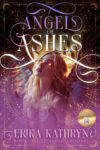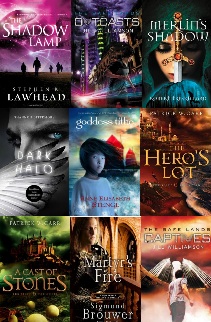Reading Choices: Do Christians Deserve Our Support?
 Some time ago, a guest wrote a post here at Spec Faith which suggested that readers ought not take into consideration the author’s worldview in evaluating a story, but rather that the story should stand–or fall–on its own merit. I understand the principle and to a large extend, agree.
Some time ago, a guest wrote a post here at Spec Faith which suggested that readers ought not take into consideration the author’s worldview in evaluating a story, but rather that the story should stand–or fall–on its own merit. I understand the principle and to a large extend, agree.
I mean, I enjoyed listening to works by Mozart and that didn’t change once I learned about his rather hedonistic, godless lifestyle. Should stories be any different? Should I enjoy The Adventures of Tom Sawyer less because Mark Twain pretty much hated Christianity?
This issue, however, took a turn during last year’s Clive Staples Award when some people intimated that the award meant to feature the best of Christian speculative fiction ought, in fact, to honor authors who are Christian, excluding those who demonstrate through social media that they do not adhere to some standard Christian principles. Should a person who writes things construed as racist be honored as a Christian author? Should a person who publicly denigrates a well-known Bible-believing Christian for his adherence to the view of God expressed in the Old Testament, be held up as a standard bearer of Christian speculative fiction?
To be honest, I began to second guess my earlier position.
 Some writers believe that a person’s worldview can’t help but “seep into” a story. It is, after all, how the author looks at and understands life. I’ve long disagreed with that position. For example, I didn’t see hatred for Christianity in Tom Sawyer. Some anti-church attitudes, yes. Some scorn of superstition, but not a “terrible religion” theme, overt or otherwise. It simply wasn’t part of his story.
Some writers believe that a person’s worldview can’t help but “seep into” a story. It is, after all, how the author looks at and understands life. I’ve long disagreed with that position. For example, I didn’t see hatred for Christianity in Tom Sawyer. Some anti-church attitudes, yes. Some scorn of superstition, but not a “terrible religion” theme, overt or otherwise. It simply wasn’t part of his story.
Recently a Christian who writes horror said on Facebook he doesn’t consider himself a Christian horror writer. While he writes from his worldview, he said, his stories are simply good horror and not Christian, per se. My thought, then is this: how does a Christian have a worldview that is not Christian? And if a Christian worldview, than how are the stories not Christian?
In this light, I question the “seep” method. I believe an author can intentionally include or withhold elements of his belief system.
All this brings me to the question: might our reading habits when it comes to contemporary books need a different standard from the one we use in reading books by writers of another era?
As I see it, there are writers who write stories from a broad-base worldview. They say nothing that challenges society’s status quo, one way or another, no matter what their personal beliefs might be. Anyone can read and enjoy those stories.
Another group writes with their worldview in mind. They communicate their worldview through their stories, overtly or in a subtle way. For some of these authors, the Bible informs their worldview; for others, disbelief in God is at the heart of their worldview.
If readers, then, embrace stories written for the purpose of communicating hatred toward God, a la His Dark Materials by Phillip Pullman, are we not contributing to the elevation of that worldview? Aren’t we sending signals to publishers that we want more books of like kind?
Recently author Mike Duran addressed this same issue, questioning if perhaps readers are responsible for the type of Christian fiction which is most popular. If readers want nothing but sweet romance with a conversion thrown in, why wouldn’t publishers give that to them? Of course, my position is that readers want a lot more, but convincing publishers of this is hard and helping readers find the books they want, perhaps harder.
Nevertheless, the point remains: readers seem to influence what kinds of books publishers print (or produce digitally). So the question: ought readers to support authors whose worldview aligns with ours? Ought Christians support Christian writers by buying their books? Ought Christians support Christian writers who write stories that communicate a worldview with which they agree? Even if the story and/or writing might be inferior to ones produced by writers with a worldview antagonistic to God?
 Thankfully, a host of quality Christian speculative writers exist. But I also know, with the many different publishing models available to us today, there are also a lot of people writing stories that are not new or innovative and that have problematic prose, but who have a high purpose to honor God and communicate the truth of His Word to those who don’t know Him. And there are those who want to write artistic stories to the point of ignoring Biblical truth.
Thankfully, a host of quality Christian speculative writers exist. But I also know, with the many different publishing models available to us today, there are also a lot of people writing stories that are not new or innovative and that have problematic prose, but who have a high purpose to honor God and communicate the truth of His Word to those who don’t know Him. And there are those who want to write artistic stories to the point of ignoring Biblical truth.
What are Christian readers to do with either of those types of books? Do we support those writers with whom we agree? Do we give a theological pass to those who are aiming for innovation and speculation? Do we judge books solely by their merit or is it fair to say, I want to see this writer succeed because he believes what I believe, or, I want to see this writer fade from the scene because I disagree with his beliefs?
I’d love to hear your thoughts on the subject, and please feel free to share this post with your reading friends.
























I plan on eventually reading His Dark Materials, if for no other reason than that I’m insanely curious about what an explicitly anti-God fantasy story looks like. I won’t be financially supporting the publisher or the franchise, because I use the library.
Not to the exclusion of other stories, not if we care about participating in the discourse initiated by stories created by people of other worldviews. It’s impossible not to support a book by consuming it and discussing it — unless you define “support” purely as financial support. In that case, if you really hate an author but want to become familiar with the author’s work, you can always pirate an illegal ebook.
I’m not bothered by the worldly success of non-Christians and their endeavors. Why should I wish them poverty and failure? Should I hope that a car dealership owned by a non-Christian will close down, in order that the car dealership owned by the guy from my church might get more business?
I want Christianity to be used and depicted honestly in storytelling. I want real Christian themes, not anemic stereotypes of Christian themes. Christian authors should be able to write the best Christian themes.
I feel for the many as-yet unsuccessful Christian writers, and maybe our shared faith gives me some responsibility to help them. I am tentatively, occasionally willing to risk my time and money with an unproven novel, and sometimes I may be willing to go through the ordeal of reviewing that novel. That’s the best that I can possibly do as a reader.
I’m not willing to refrain from discussing Star Trek out of the hope that the originally atheistic franchise will collapse. I think I could serve Christianity better by participating in the secular franchise as a Christian.
I read the Dark Materials back in high school. It’s not bad, interesting in plenty of places, but since I was still pretty sheltered at that point, a lot of it shocked me. I wasn’t used to so much moral ambiguity in characters at that point. (Lyra’s kind of a [bleep], and I was still expecting to be able to sympathize or identify with the main character.)
I was surprised by how dull and not shocking the series was when I read it but then I was a young adult at the time. I was pleasantly surprised and delighted by Harry Potter during the same time period. 😀
In spite of what Mr. Pullman was trying to do, I really wouldn’t have any issues with my (potential future) kids reading his books. There’s enough of a contrasting worldview in there for some lively discussion.
I’m with you on your description of Lyra’s character btw. Her mom is more sympathetic by the end of the series than she is! 😛
Well, my argument to support Christian writers is that secular writers will either ignore us, or make harmful stereotypes about us. Especially in spec fiction, honest portrayals of Christians, let alone Christian themes, are rare to non-existent. I know for me, that made me feel like a stranger in a strange land, reading books suffused with values opposite to my own.
That doesn’t mean you can’t enjoy them, but there’s an estrangement there that I don’t think can be ignored long term. I kind of like reading books where I don’t always have to ignore the moral of the story or close my eyes to how my faith is treated by them.
I personally go on a case-by-case basis using both of those criteria. I like George MacDonald even though there’s some sexism and classism in his works (at least he has the excuse of being a literal Victorian), but if Mark Driscoll were to write some fiction, I would shun it like the plague because I don’t want to support Mark Driscoll (also, there’s a solid chance it would be awful because of his alpha-male bullcrap [and possibly also plagiarized]). But if someone with theology/philosophy that I liked were to write a lame story, nope, not gonna support that. Ted Dekker kinda-sorta fits in that category for me. (BTW, anyone want to buy my boxed hardback set of his Circle series? I need to thin my book collection, and also I’m poor.)
Off-topic alert, but I found this thing that is very interesting about the translation of Ecclesiastes: http://experimentaltheology.blogspot.com/2014/01/life-is-fleeting-hebel-in-ecclesiastes.html
“Ought Christians support Christian writers who write stories that communicate a worldview with which they agree? Even if the story and/or writing might be inferior to ones produced by writers with a worldview antagonistic to God?”
By definition, a poorly-written “Christian” novel communicates a worldview with which I disagree. Its very essence — caught and displayed in its prose, its characters, its plotting and pacing and undercurrents of meaning — screams that ideas are more important than craft, that being right is more important than being beautiful, that certain magic words are more important than deeds. It declaims, loudly and garishly, that it simply wasn’t worth the author’s time to labor over a work of beauty. And it attempts to appropriate my allegiance through appeals to obligation: “You should read me, you should like me, you should support me! You are a Christian, aren’t you?”
But support should never arise from obligation. I don’t follow Christ because I should; I follow Him because even the faintest glimpse of the magnitude of His heroism leaves me joyfully weeping and groveling in the dust. I follow Him because He’s the most beautiful, the most glorious, the most awe-inspiring thing I’ve either seen or imagined. I follow Him because He won my heart.
If a Christian author wants my support, he or she must win my heart. Period, end of story. That’s what storytelling’s all about, is it not? When did we lose sight of that?
I guess I would support a Christian author a little more, just because they’re family. If it was not amazing but OK, I’d cut them some slack for the same reason. But I would also wish it was better, far more than I would care about a badly written non-Christian book.
You pretty much wrote what I wanted to say, Kirsty. 😀
The Christian storyteller gets my support, of a sort, because he or she is a spiritual family member. A fellow resident of our true Home, sojourning with us in this foreign land. But this is the same reason why we’d feel more embarassed by a misbehaving or awkward family member at a family reunion or out in public, than we would feel at the actions of a non-family member. And this is also why we would be even more embarassed by, say, the absurd actions of a fellow citizen as we’re both in another country, than we would by another nation’s citizen doing something untoward.
I think an author’s status as a fellow believer is a good and sufficient reason to support them, as we would any fellow believer, with prayer, encouragement, advice, etc—moral and spiritual support.
On the other hand, it’s a good, but not sufficient, reason to promote their work (become their advertiser and encourage others to buy their book), and I think Austin’s hit on an important point: quality of workmanship communicates worldview (or undermines it) in a powerful way. Christian Writer X may be a saint and my friend, but if their writing skills aren’t ready for prime-time or they misrepresent the faith we both hold dear, whether through clumsiness, carelessness, or intent, I can’t in good conscience offer them more than moral and spiritual support—yet.
Likewise, I wouldn’t promote a poorly-written story by a secular author, or one with a Christian-bashing agenda. I might promote a well-written secular story with embedded Christian themes or values, because truth is truth, and the story can provide common ground for conversation between Christians and non-Christians.
When we begin to insist that Christians support and promote Christian writers across-the-board, we’ve subtly introduced an arbitrary spirituality check. Is the story (and, by implication, the writer) Christian enough, or Christian at all? If the reader doesn’t support Christian Writer X, is the reader Christian enough, or Christian at all? We can make an appeal to theological orthodoxy on either or both sides, but who’s going to define the criteria and make that determination, and how is it to be enforced?
We can go back to Stephen’s criterion and say, “I’m only going to support and promote stories I love,” which is, I think, a decent practical rule of thumb but may need to be unpacked a bit with regard to why we love a particular story (I think Stephen’s thoroughly explained what he’s looking for by now). It’s also going to vary among readers.
Yes.
I also think a diustinction has to be made between adequate-but-not-amazing, which is OK, and really-not-good-enough-for-publication, which is not (but all too common). It also depends on context – a short story in a church magazine need not be to the same standard (of skill) as one professionally published and in the shops.
I would never promote anything (secular or Christian) which I didn’t think was OK, or didn’t know anything about. (Which is why I rarely endorse friends on LinkedIn – who am I to say that they know about Cost Management or whatever!)
The word “deserve” sets off all sorts of little red flags. Other than common curtsy and responsible interpretations, do authors and readers owe anything to each other?
Great discussion. I was having some technology issues last week which kept me from participating, but i hope to rift off some of these thoughts in the coming weeks. You’ve given me a lot to think about. Thanks for your interaction.
Becky